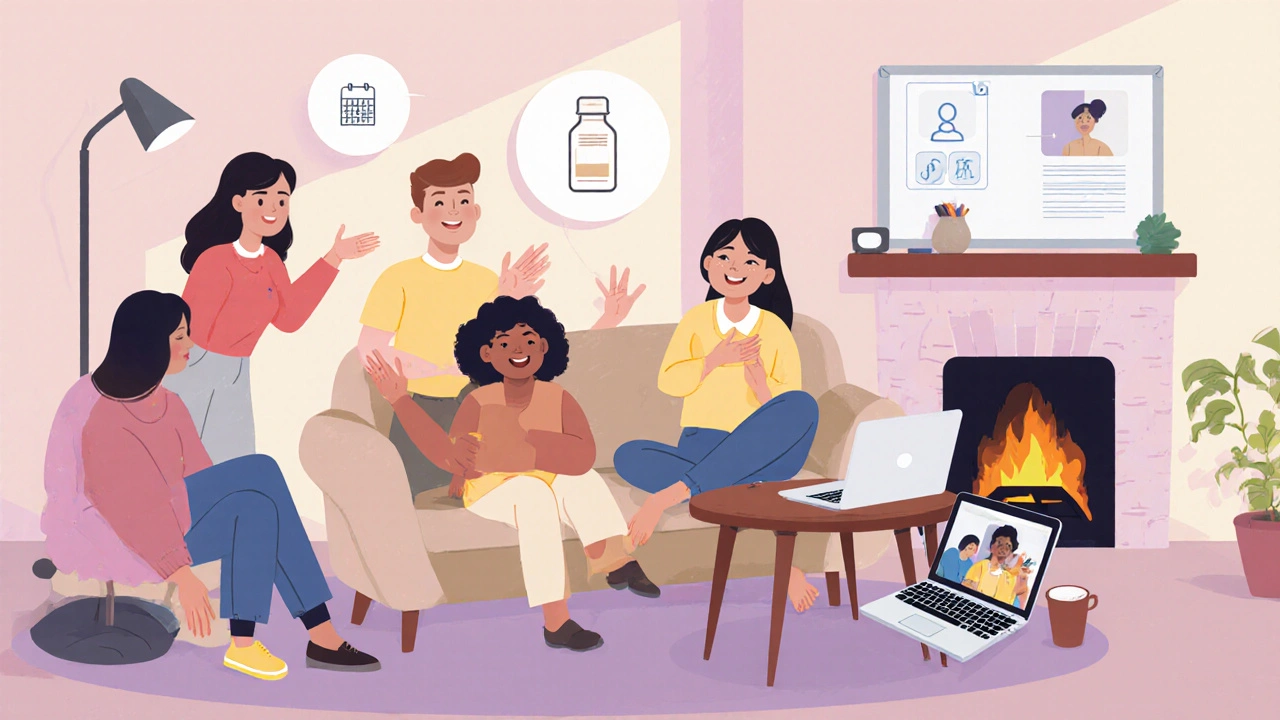Effective Coping Strategies for Living with Hodgkin's Disease
 Oct, 12 2025
Oct, 12 2025
Hodgkin's Disease Symptom Tracker
Track Your Daily Symptoms
Log your symptoms to identify patterns and get personalized coping suggestions.
Daily Coping Suggestions
Track your symptoms to get personalized coping suggestions.
Finding a way to keep life moving when Hodgkin's disease shows up can feel like trying to steer a bike on a bumpy road. You want to stay active, keep your spirit up, and still manage medical appointments, treatment side‑effects, and everyday responsibilities. This guide walks you through practical ways to do just that, from food and exercise to mental health tricks and support‑group tips.
What Is Hodgkin's Disease?
Hodgkin's disease is a type of lymphoma that starts in the lymphatic system, the body’s network for fighting infection. It was first identified by Thomas Hodgkin in 1832 and accounts for about 10% of all lymphoma cases worldwide. The disease is characterized by the presence of Reed‑Sternberg cells, which are large, abnormal cells that can be spotted under a microscope. Staging (from I to IV) tells doctors how far the cancer has spread, guiding treatment choices such as chemotherapy, radiation therapy, or newer immunotherapy options.
Physical Challenges You’re Likely to Face
Even before treatment starts, many patients notice fatigue, night sweats, and swollen lymph nodes. Once therapy begins, side‑effects can add up:
- Chemotherapy often brings nausea, hair loss, and a drop in blood counts, which raises infection risk.
- Radiation therapy may cause skin irritation in the treated area and, over the long term, affect thyroid function.
- Immunotherapy can lead to flu‑like symptoms, joint pain, or skin rashes.
Knowing which symptoms are common helps you prepare coping actions ahead of time.
Nutrition and Energy Management
Food becomes a powerful ally when your body is battling cancer. Small, frequent meals that combine protein, complex carbs, and healthy fats keep blood‑sugar levels stable and fight fatigue.
Examples of easy‑to‑digest options include:
- Greek yogurt topped with berries and a drizzle of honey.
- Whole‑grain toast with avocado and a soft‑boiled egg.
- Smoothies blending spinach, banana, almond milk, and a scoop of whey protein.
Staying hydrated is just as vital. Aim for at least 2liters of water daily, and consider herbal teas like ginger or peppermint to ease nausea.

Emotional and Mental Well‑Being
Facing a cancer diagnosis can trigger anxiety, depression, or a sense of loss. Your mind needs as much care as your body.
Try these mental‑health habits:
- Set aside 10minutes each morning for deep‑breathing or guided meditation; apps such as Headspace or Calm offer short sessions designed for beginners.
- Write a brief journal entry each night. Recording worries, gratitude, and daily wins can reduce rumination.
- Schedule regular check‑ins with a therapist who specializes in oncology patients. Cognitive‑behavioral therapy (CBT) has shown measurable improvements in cancer‑related distress.
Remember, it’s okay to ask for help-mental health professionals, friends, or even online communities can provide the reassurance you need.
Building a Support Network
No one should walk this road alone. A solid support system can improve treatment adherence and overall quality of life.
Key sources of support include:
- Family and friends-they can handle grocery runs, drive you to appointments, or simply listen when you need to vent.
- Support groups-both in‑person (often hosted by hospitals) and virtual (found on platforms like Facebook or dedicated cancer‑patient forums). Sharing experiences with people who truly understand reduces feelings of isolation.
- Patient navigators-trained staff who guide you through insurance paperwork, scheduling, and community resources.
When you’re feeling overwhelmed, reach out to the person or group that feels most comfortable; even a brief phone call can shift your mood.
Treatment‑Related Coping Strategies
Choosing the right treatment is a shared decision between you and your oncologist. Below is a quick side‑by‑side look at the three main options, highlighting typical side‑effects and practical tips.
| Treatment | Typical Duration | Common Side‑Effects | Coping Tips |
|---|---|---|---|
| Chemotherapy | 6-8months (multiple cycles) | Nausea, hair loss, lowered blood counts | Anti‑emetic meds before sessions; gentle exercise like walking; use soft hats or scarves for hair loss. |
| Radiation Therapy | 3-6weeks (daily fractions) | Skin redness, fatigue, possible thyroid changes | Moisturize skin daily; protect treated area from sun; schedule rest periods after each session. |
| Immunotherapy | Varies (often weekly infusions) | Flu‑like symptoms, joint aches, rash | Stay hydrated; use acetaminophen for fever; apply calming lotions for rash. |
Regardless of the modality, keep a symptom diary. Recording intensity, timing, and any triggers helps your medical team adjust doses or add supportive meds.

Daily Lifestyle Tips to Boost Quality of Life
Small habits add up over weeks and months. Here are five easy actions you can adopt today:
- Prioritize sleep. Aim for 7-9hours in a dark, cool room; avoid screens an hour before bedtime.
- Gentle movement. Even light stretching or a 15‑minute walk can reduce fatigue and improve mood.
- Mindful breathing. When anxiety spikes, inhale for 4 seconds, hold for 4, exhale for 6. Repeat three times.
- Stay organized. Use a whiteboard or digital app to track appointments, medication timings, and grocery lists.
- Celebrate milestones. Whether it’s finishing a chemo cycle or a week of steady nutrition, reward yourself with something enjoyable-a movie night, a new book, or a short outing.
These practices keep you grounded and give your body a predictable rhythm during an unpredictable treatment journey.
Planning for the Future and Survivorship
Once treatment ends, the focus shifts to long‑term health. Survivorship care plans typically include:
- Regular follow‑up scans (often every 6-12months for the first two years).
- Blood tests to monitor thyroid function, blood counts, and organ health.
- Vaccinations-especially flu and pneumococcal vaccines-to offset the weakened immune system.
Consider enrolling in a survivorship program at your cancer center; these programs combine physical rehab, counseling, and lifestyle coaching. They also help you address late effects such as secondary cancers or heart disease, which can appear years later.
Financial planning is another hidden stressor. Speak with a hospital financial counselor about insurance coverage, possible grants, and tax deductions for medical expenses. Knowing you’ve covered the paperwork lets you focus on living.
By staying proactive-maintaining healthy habits, staying connected, and keeping screenings on schedule-you increase the odds of a smoother, fulfilling life after Hodgkin's disease.
Frequently Asked Questions
Can I work while undergoing treatment?
Many patients continue part‑time or flexible work, especially if they can manage fatigue with scheduled breaks. Discuss your treatment schedule with your employer early; a gradual return often works better than a full‑time jump.
What foods should I avoid during chemotherapy?
Limit raw or undercooked eggs, meat, and seafood to reduce infection risk. Heavy, greasy meals can worsen nausea, so opt for lighter, easily digestible options.
Is it normal to feel depressed after a diagnosis?
Yes, emotional reactions are common. Studies show up to 35% of newly diagnosed patients experience clinical depression. Early counseling and peer support can dramatically improve outcomes.
How often should I see my oncologist after treatment ends?
Typically every 3-4months for the first two years, then spacing out to every 6-12months if scans remain clear. Your doctor will tailor the schedule to your specific stage and treatment history.
What resources are available in the UK for Hodgkin's disease patients?
Macmillan Cancer Support offers helplines, local support groups, and financial advice. The Lymphoma Action charity provides disease‑specific literature, webinars, and a patient‑to‑patient matching service.

Dominique Jacobs
October 12, 2025 AT 16:23Stay strong, you got this!
Claire Kondash
October 25, 2025 AT 10:13Reading through this guide feels like stepping into a quiet garden of resilience, where each suggestion is a blooming flower offering both shade and sustenance 😊. It’s remarkable how the author weaves together nutrition, mental health, and practical logistics into a tapestry that feels both intimate and universal 💪. The emphasis on small, frequent meals resonates deeply, reminding us that stability can be found in the rhythm of a well‑timed snack. Moreover, the meditation techniques suggested echo age‑old philosophical practices, aligning breath with intention-a silent dialogue between body and mind. The inclusion of support groups acknowledges the collective nature of healing, turning isolation into a shared pilgrimage. One cannot overlook the detailed treatment comparison table; it serves as a compass for navigating the often‑foggy seas of medical jargon. The advice to keep a symptom diary is not merely practical but also a form of narrative therapy, allowing patients to author their own stories rather than be mere subjects of clinical observation. The section on survivorship is especially poignant, urging readers to think beyond the immediate horizon and consider long‑term wellness, a perspective often omitted in acute care. While the guide is thorough, it also invites personalization-encouraging each individual to adapt the tips to their unique tempo and temperament. The gentle reminder to celebrate milestones, however modest, cultivates a culture of gratitude amidst adversity. It is as if the author is quietly chanting a mantra: “you are more than a diagnosis,” echoing across every paragraph. The balanced tone avoids both alarmism and false optimism, striking an equilibrium that feels both honest and hopeful. The practical tips about hydration, skin care, and sleep hygiene are grounded in evidence yet delivered with compassion, bridging the gap between science and lived experience. The inclusion of financial planning resources reflects an understanding of the holistic burden that disease imposes, extending care beyond the purely medical. The guide’s structure, moving from physiological challenges to emotional scaffolding, mirrors the journey many patients undergo, making it a reliable companion through the ebb and flow of treatment. Ultimately, this resource stands as a beacon, illuminating pathways that intertwine self‑advocacy, community, and self‑care-an essential compass for anyone navigating the tumultuous waters of Hodgkin’s disease.
Matt Tait
November 7, 2025 AT 02:46Let’s cut the fairy‑tale fluff and call this out for what it is: a generic checklist that anyone could pull from a standard oncology pamphlet. The "personalized" tips are so vague they’d apply to a cold, not to the complex side‑effects of chemo or immunotherapy. You’re basically telling patients to "stay hydrated" and "sleep well," which is a joke when they’re dealing with relentless fatigue and severe nausea. Frankly, this post feels more like a marketing brochure than a real coping manual.
Benton Myers
November 19, 2025 AT 20:20I appreciate the calm tone here; the guide does a solid job of covering a lot of ground without getting preachy.
Pat Mills
December 2, 2025 AT 13:53While I value the effort, one must admit the narrative drifts into melodramatic territory, painting every bite of food as a heroic act against an invisible foe. The prose gallops with grandiose adjectives, turning simple nutrition advice into an epic saga that can overwhelm rather than soothe. There’s a theatrical flair in the way “celebrate milestones” is shouted, as if each chemotherapy session were a battle won on a grand stage. Yet, amidst the drama, the practicality sometimes gets lost, leaving the reader yearning for concrete, down‑to‑earth steps. In the end, the guide oscillates between sincere compassion and over‑embellished exhortation, making it a mixed bag for those seeking straightforward guidance.
neethu Sreenivas
December 15, 2025 AT 07:26Thanks for sharing this, it really resonated with me 😊. I especially like the reminder to write a journal each night; it’s such a gentle way to process emotions. Also, the tip about small, frequent meals can truly make a difference when appetite is low. Keep the empathy flowing-every bit of support matters! 🌟
Dharmendra Singh
December 28, 2025 AT 01:00Here are a few addiitonal tipss you might find uesful. First, try to keep a regular schedule for meditations – even five minuets a day can help. Second, consider using a flavourless electrolye drink to keep your boddy hydrated without upsetting the stomach. Finally, ask your oncologist about prophylactic anti‑nausea mediscation before each chemo session.
Rocco Abel
January 9, 2026 AT 18:33Ah, the quintessential guide-crafted with the utmost sophistication that only a privileged few can truly appreciate. One must wonder how many elitist circles have already dissected this in their private salons. Nonetheless, the information is, of course, utterly impeccable.
Dawn Mich
January 22, 2026 AT 12:06Don't be fooled by the polished language; it's a distraction from the hidden agenda of big pharma pushing their own narrative. The real cure lies outside the system, in the ancient practices they refuse to mention.
Aaron Perez
February 4, 2026 AT 05:40Well-here’s the thing: the guide-while seemingly helpful-actually sidesteps the core issue; it glorifies "positive thinking," which, frankly, is a cop-out. If we’re being sincere, we need to address the systemic gaps-nutrition, mental health, financial strain-head‑on, not just sprinkle generic advice.
Riley Fox
February 16, 2026 AT 23:13Interesting take! 🤔 However, the data shows that structured symptom tracking does improve outcomes-so let's not dismiss evidence. 📊